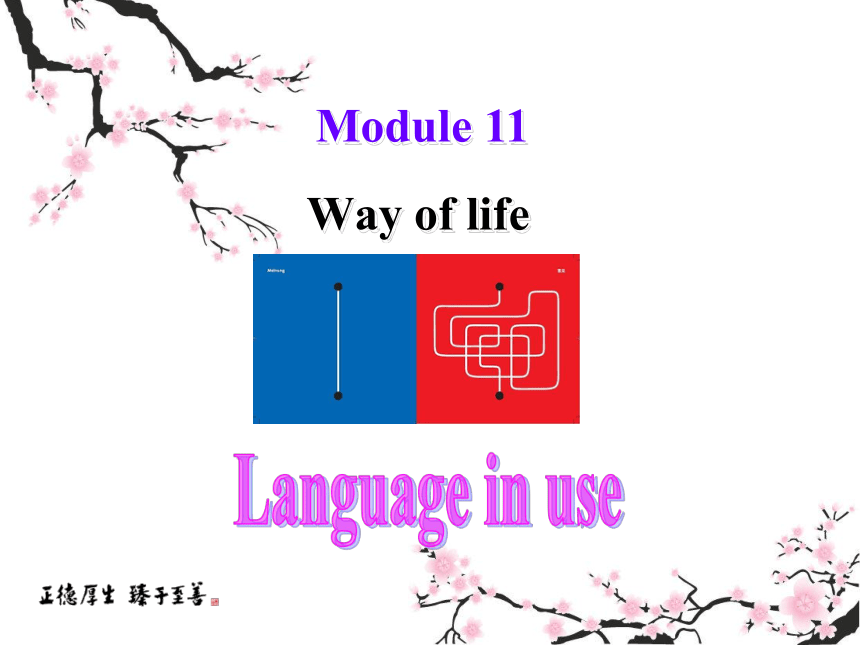
课件26张PPT。Way of lifeModule 11Language in use情态动词?must/can/need?等 1. must must 表示“必须,一定要”,可用于肯定句、否定句和疑问句。否定形式 must not (mustn't) 表示“不能”或“禁止”的意思。例如: In my home town, people say you mustn't do any cleaning on the first day of the Spring Festival.? 在我的家乡,据说大年初一不能打扫卫生。 You must use red paper for?hongbao?because red means luck.? 你必须用红纸做红包,因为红色代表幸运。2. can can 表示“许可,可以”,可用于肯定句、否定句和疑问句。否定形式 cannot(can't)表示“不能,不可以”,语气弱于 must not(mustn't)。例如: You can't put the milk in first.? 你不能先倒牛奶。(没有禁止的含义) When you get to know each other better or when they ask you to, you can just use their first name.? 当你们更加熟悉或他们请你(这样做)时,你就可以只称呼他们的名字。 Can I have a look at your photo?? 我可以看一下你的照片吗? ★请注意,本模块所学的 can 与以前我们所学的 can 意义不同,以前我们所学的 can 表示“能力”,这里表示“允许”。 3. need need 作情态动词表示“需要”,可用于肯定句、否定句和疑问句。否定形式 need not(needn't)比较常用,表示“不需要”或“不必要”。例如: If she wants anything, she need only ask.? 如果她要什么,说一下就行了。 You needn't wait.? 你不必等待。★请注意,need 也可以作行为动词,表示“需要”,常用于 need to do sth. 结构。例如: I need to clean the house.? 我需要把房子打扫一下。 You don't need to leave now. It's still early.? 你没必要现在走,还早呢。4. must, can, need 的一般疑问句的构成及其回答 请看下列三组例句: — Must I come before 6:30 tomorrow?? 明天我必须在六点半之前来吗? — Yes, you must.? 是的,你必须在那之前到。(表示一定要) — No, you needn't.? 不,你不必在那之前来。(表示没必要,相当于?You don't have to.)— Can we go home now, please?? 请问我们现在能回家吗? — Yes, you can.? 可以。(表示允许) — No, you can't.? 不行。(表示不允许)— Need I report it to the police?? 我要向警方报告这件事吗? — Yes, you must.? 是的,你必须报告。(表示必须做) — No, you needn't.? 不,没必要。(表示没必要) 5. must 与 have to?的区别 两者都表示“必须”,但 must 侧重于说话者的主观看法,认为有必要或有义务去做某事 ; have to 侧重于客观需要,含有“不得不,被迫”之意。例如: All passengers must wear seat belts.? 所有乘客都要系安全带。 My bike was broken yesterday, so I had to walk to school.? 昨天我的自行车坏了,所以我只能走路去学校。 用于否定句时,must 的否定式 must not(mustn't)表示“一定不要,不允许”;而 have to 的否定式 do not(don't)have to 表示“不必”(= needn't)。请比较: You mustn't tell him about it.? 你绝对不要告诉他这件事。(可能是秘密) You don't have to tell him about it.? 你不必告诉他这件事。(他可能知道了或者没有必要让他知道)6. had better had better 表示劝告或建议,意思是“最好……”。例如: You'd better get some sleep.? 你最好睡一会儿。 had better 一般不用于疑问句中,但可用于否定句中,其否定形式为 had better not。例如: You'd better not waste any more of your time.? 你最好别再浪费你的时间了。 Complete the conversations with can or can’t. 1 A: Can you drive a car at the age ... ...
~~ 您好,已阅读到文档的结尾了 ~~